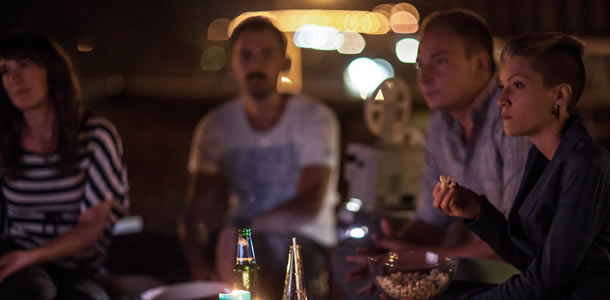
Documentary film clubs – think book clubs, but for docs – are the heart and soul of Influence Film Club. We actively support real people having real interactions more often.
Not sure what film to pick? Each month we select one of our favorite docs as our “film of the month.” Why not invite some others over to watch it with you? Don’t forget to sign up for our newsletter! We aim to make your club experience as fruitful and fun as possible by offering up a monthly challenge, interviewing the director, providing film discussion guides that delve deeper into the issues raised in the film, and supplying you with links to inspiring articles and information related to the film.
 discover films
discover films



 discuss with friends
discuss with friends

Watch the film in your own time, then meet together in someone’s home, a cafe, pub, bookshop, etc. to discuss the film.

Watch and discuss the film with your group at someone’s home. The power of experiencing a film alongside others has such a strong impact, can inspire discussion and even instigate meaningful change.

Meet at a location other than someone’s home, such as a theatre, cafe, pub, studio, etc. Watch and discuss the film together.
Since we are not a distributor, we do not provide the film on our site. However, on each individual film page, we offer links to find and watch the film through legal, reputable sources – justwatch.com is one of our favorite video-on-demand (VOD) search platforms, and is available for a number of regions. If you don’t see your region under the “Where to Watch” section on the film page, we suggest searching your region’s popular VOD platforms or looking for DVDs for sale in your area. We always support watching documentaries legally!
“Watch First, Meet Later” is the most time-efficient option, as it allows you to watch each film at your own convenience. Meetings are usually shorter, though this type of group does miss out on the joy of watching the film together.
Depending on the type of club you join, you might need to watch the film before meetings. Otherwise no individual preparation is necessary – just arrive ready to watch and discuss. The only preparation that is required is of the host, who is in charge of organizing the meeting. Each and every club decides how simple or elaborate a meeting will be.
We find the comfort and coziness of a friend’s living room to be a wonderful place for a film club gathering, but the list of great settings goes on and on. How about a good old classic – a movie theater. Cafes, libraries, pubs, bookshops, yoga studios, art galleries are all also great places to approach about hosting a screening. Weather permitting, try meeting outside in a park at night for a starlit screening. And how about building a campfire for the discussion. The possibilities truly are endless.
In our mind, the ideal club has around 12 members. This allows for better communication and accountability, and ensures that everyone has a chance to be involved, with plenty of different ideas and opinions on offer. However, not every member will be able to attend every single meeting. A club size of 12 can accommodate a few absences, as well as a few visitors. If your group is larger than this, we recommend breaking into smaller groups for discussion. Smaller groups, in turn, allow for more intimate, in-depth discussions. So long as you’re getting together around a great doc, no group is too big or too small!
If you are hosting a small private group at home, you do not need a screening license. If you are showing the film at an open public place, a school, or library then you will most likely need to pay a licensing fee. If you open your event to the general public and charge an entrance fee, then you do require a cinematic screening license. Laws can vary by country and region, so check with the relevant authorities. If you are confused on where to begin, start by visiting the specific film’s website, where there is often a “request a screening” page with helpful information – we often include a link to this information under “Where to watch > Other places to watch” on our film pages. Alternatively, contact the filmmaker or production team asking for help. Documentary filmmakers (in our experience) are wonderfully kind and easily approachable and are more often than not happy to help you screen their film, whenever possible.